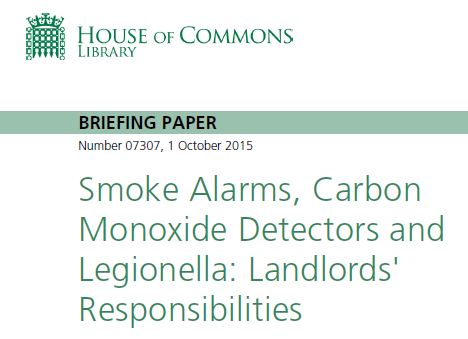Clarification of your legal obligations.
06 October 2015.
For the avoidence of any doubt the House of Commons have issued a new paper on the 1st October making the requirements crystal clear.


Be in no doubt, You must undertake this simple assessment.
Back to property118 assessment form
It is important to understand the difference between a 'Legionella Test Certificate' (not required) and a 'Legionella Risk Assessment' (legally required)
From the HSE.Gov website: Case 357:
Some consultants & letting agents misinterpreting landlords responsibilities regarding legionella risks to their tenants.
The Issue
Some consultants and letting agents are using the revised L8 ACOP to suggest that new legislation has been imposed on landlords of domestic rented properties in relation to assessing and controlling the risks of exposure to Legionella bacteria of their tenants.
This is wrong, the legislation has not been changed and any misinterpretation/misunderstanding can impose unnecessary financial burdens on landlords where they are being charged for legionella testing and certificates they don’t actually need.
Panel Opinion.
- Whilst there is a legal duty for landlords to assess and control the risk of exposure to legionella bacteria, Health and Safety law does not require landlords to produce a ‘Legionnaires testing certificate'.
- Legionella testing (or sampling) is generally not required in domestic hot and cold water systems and then only in exceptional circumstances.
- Misinterpretation of the legal requirements by some consultants and letting agents about landlords responsibilities to manage and control legionella in domestic premises may result in unnecessary financial burdens being placed on landlords and tenants.
So please be clear. If someone tells you you need a Legionella 'Test Certificate' this is incorrect and can be very expensive.
Testing for legionella involves taking samples of water and sending them to a laboratory for testing. This is not required in domestic rental properties.
What you must have is a Legionella 'Risk Assessment' which is what we provide here at The LRA Register.
A risk assessment is legally required. This involves assessing the property to see if there is a 'RISK' of legionella forming in the water system.
Link to HSE.gov document.
A landlord is anyone who rents out a property they own under a tenancy agreement that is shorter than seven years. Landlords' duties apply to a wide range of accommodation, occupied under a lease or a licence, which includes residential premises provided for rent.
As a landlord, or a person in control of the rental premises, you are responsible for health and safety and need to take the right precautions to reduce the risks of exposure to legionella.
Carrying out a legionella risk assessment is your responsibility. If you use our simple step by step procees you will be able to carry out the assessment yourself.
When completed, a copy of your legionella risk assessment should be given to your tenant as it contains paractical advice on how to keep the water system safe.
Section 3(2) of the Health and Safety at Work Act 1974 (HSWA) makes provision for relevant health and safety legislation to apply to landlords to ensure a duty of care is shown to their tenants’ with regard to their health and safety. The general duties require under section 3(2) that "It shall be the duty of every self-employed person to conduct his undertaking in such a way as to ensure, so far as is reasonably practicable, that he and other persons (not being his employees) who may be affected thereby are not thereby exposed to risks to their health or safety.". Landlords, under Section 53 of HSWA are regarded as being self-employed and tenants fall into the class of “other persons (not being his employees)”. If you rent out a property, you have legal responsibilities to ensure you conduct your undertaking in such a way that your tenant(s) are not exposed to health and safety risks.
This is not an option - You must carry out a Legionella Risk Assessment.
Back to property118 assessment form


